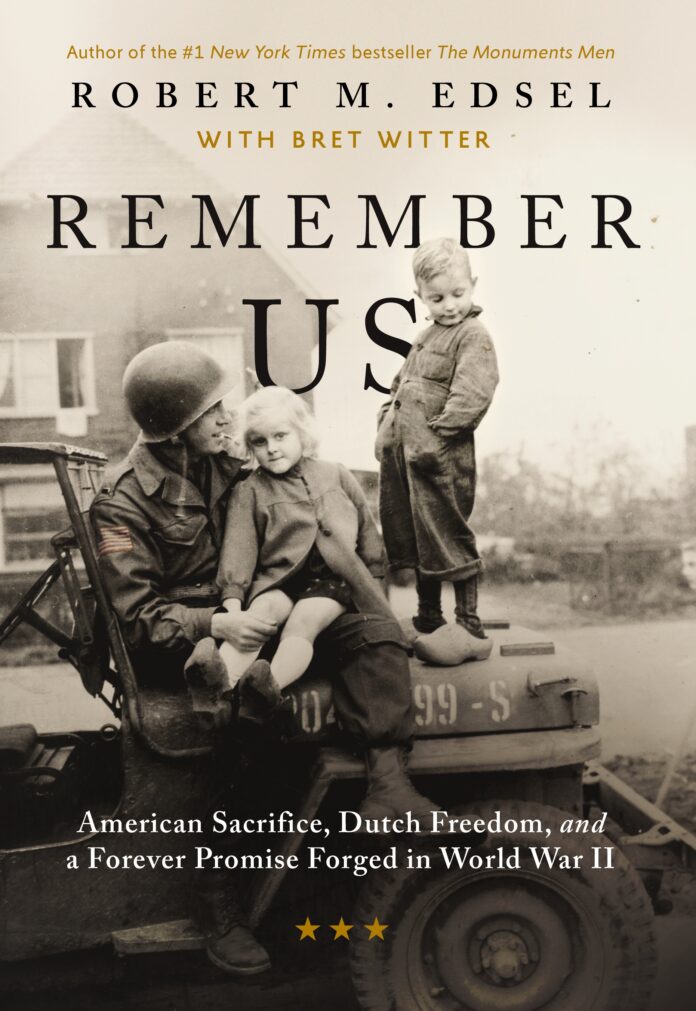By Robert M. Edsel
With the end of World War II in Europe, letters from American families seeking information about their loved ones began arriving at town halls across the southern Netherlands. Postmarked from big cities and small towns, from those of privilege and those barely scraping by, each one contained a heartbreaking request similar to that of a young widow from Demopolis, Alabama:
My husband…was killed in Germany on his birthday, April 18, 1945, and is buried in the U.S. Military Cemetery at Margraten, Holland, near your town of Maastricht…He was my whole life to me…Since you live so near…I will be grateful all of the days of my life if you can get me a snapshot of his grave.
Oftentimes, the next of kin only knew the country where their loved one was buried, nothing more. The Dutch, though, knew this hallowed ground well. They had watched American quartermaster troops turn one of their fields into a cemetery in late 1944. They had watched the endless trucks full of bodies drive past their homes. Many of these young, heroic soldiers they did not know. Some, with whom they had shared their homes during the bitter cold winter of 1944-1945, they knew and loved.
Wanting to express their boundless gratitude to the liberators, especially those who had given everything to end a brutal Nazi occupation and restore their freedom, the citizens of Limburg Province created a unique grave adoption program – an inspiring story I tell in my new book, Remember Us. A local volunteer was assigned to care for each of the 17,000 Americans memorialized at what today is known as the Netherlands American Cemetery, including 2nd Lt. Clyde J. Williamson Jr. from Fort Worth.
Williamson was born and raised in Fort Worth. He graduated from Paschal High School in 1942 and joined the Army Air Forces in December that year. He went to flight school in May 1943. After training, he became a copilot in a Boeing B-17 Flying Fortress and joined the 305th Bomb Group. On March 18, 1945, Williamson’s group was bombing Berlin. While over the target, the bomber took flak damage and the crew bailed out. Five were taken prisoner, three were killed, and Williamson went missing in action. His father died after being notified that Clyde was unaccounted for. He is listed among the 1,722 names on the Walls of the Missing at the Netherlands American Cemetery.
The Dutch adopters made every attempt to reach across the ocean, into American homes, to connect with their soldier’s family members. When U.S. officials refused to provide them with next of kin addresses, Emilie Michiels van Kessenich, the wife of the mayor of Maastricht – and the woman who provided the widow from Alabama with a photo of her husband’s grave – left her eleven young children to travel to the United States to meet with families who had loved ones buried overseas. “Leave your boys with us,” she promised them. “We will watch over them like our own, forever.”
Today, all these years later, the Dutch adopters continue to fulfill that “forever promise” watching over every American grave. There is even a waiting list containing a thousand names of those hoping to become an adopter.
Monday, May 26, marks the 80th Memorial Day since the end of World War II. The Dutch will be at the cemetery in force, placing flowers, saying prayers, and honoring each American. So will I. More than just a somber day of remembrance, this Memorial Day is an opportunity for each of us to search our hearts, just as the Dutch did 80 years ago, and ask: “What can I do to honor each American who fought and died in World War II, and all conflicts since, to preserve our freedom?”
For my part, I will be placing flowers on service members’ graves, supporting the Forever Promise Project to connect the next of kin of all American service members memorialized at the Netherlands American Cemetery with their Dutch adopters (ForeverPromise.org), and giving thanks for the Dutch adopters who for eight decades have set an inspiring example of the transcendent power of gratitude. Their actions remind us that grief is universal, that humanity knows no national or racial boundaries, and that we all want to be remembered, somehow, someway, by somebody.
——————————————————————–
Robert M. Edsel is the founder and chairman of the Monuments Men and Women Foundation and the #1 New York Times bestselling author of The Monuments Men. His new book, Remember Us: American Sacrifice, Dutch Freedom, and A Forever Promise Forged in World War II, tells the story of the Dutch grave adoption program and the American heroes it honors. Find out more about the Forever Promise Project at ForeverPromise.org.






